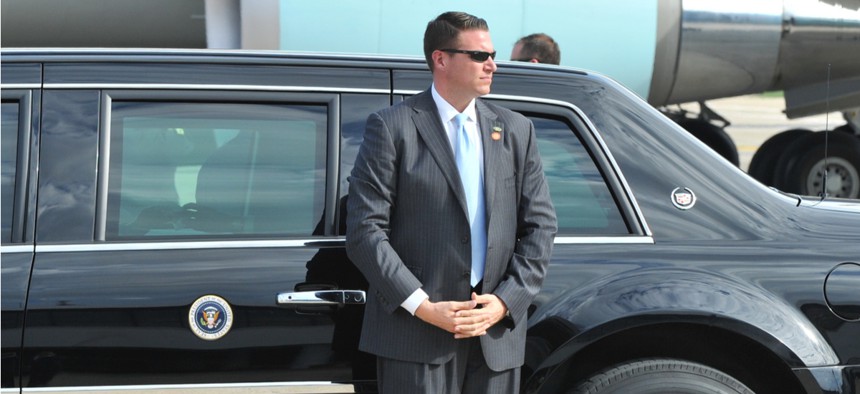New U.S. Secret Service Lapel Pins Will Come with a Secret Security Feature

An unidentified body guards waits by the Presidential State Car in Bangkok, Thailand in 2012. 1000 Words/Shutterstock.com
It's more than just a pin.
Just about everyone knows U.S. Secret Service agents for the pins they wear on their lapels. They are one component of the larger system used to identify team members and are as tied to the agency’s image as dark suits, earpieces, and mirrored sunglasses. Yet, few people know what those very recognizable lapel pins are hiding.
An acquisitions notice filed by the Secret Service on Nov. 26 says the agency is planning to award a contract for “specialized lapel emblem identification pins” to a Massachusetts company called V.H. Blackinton & Co., Inc.
The price the Secret Service is paying for the new batch of lapel pins has been redacted, as has the number of pins it is buying. Still, past orders provide a bit of context: In September 2015, it spent $645,460 on one order of lapel pins; the size of the purchase was not given. The following September, it spent $301,900 on a single order of lapel pins, and made another purchase of lapel pins for $305,030 the September after that. In total, across all federal agencies, the US government has spent a little under $7 million on lapel pins since 2008.
Blackinton & Co., which primarily makes badges for police departments, “is the sole proprietor that has the expertise in manufacturing lapel emblems that have new security enhancement technology feature [redacted],” the latest Secret Service purchasing document says. It goes on to say the agency contacted three other vendors over the course of eight months, none of which were able to “provide the expertise in manufacturing lapel emblems with any type of security technology features.”
A Secret Service spokesman declined to comment. In an email, David Long, Blackinton’s COO, told Quartz, “We are not in a position to share any of that information.” However, Blackinton’s website, which is geared specifically toward law enforcement customers, offers a clue into what the Secret Service might be getting.
Blackinton says it is “the only badge manufacturer in the world” that offers a patented authentication technology it calls the “SmartShield.” Each one contains a tiny RFID transponder chip that links to an agency database listing all the necessary information needed to verify that the person with the badge is the one authorized to be carrying it and that the badge itself is authentic.

This level of security may not be necessary on every one of the lapel pins the Secret Service is ordering; there are a few different types of pins issued to White House staffers and other so-called “cleared” personnel that let agents know who is allowed to be in certain areas unescorted and who isn’t. Other security features Blackinton says are exclusive to the company include color-shifting enamel, scannable QR tags, and embedded, tamper-proof numerical codes that show up under UV light.
The Secret Service is also aware that inside jobs are a potential issue. Past lapel pin orders that were less heavily redacted have revealed strict security guidelines before the pins even leave the factory. For example, everyone working on a Secret Service lapel pin job needs to pass a background check and be a US citizen. All tools and dies used are given back to the Secret Service at the end of each work day, and any unused blanks get turned over when the job is done. Every step of the process must take place in a restricted space which can be either “a secure room, a wire cage, or a roped- or cordoned-off area.”
Blackinton says its workspace has video surveillance at all entrances and exits and round-the-clock, third-party alarm monitoring, adding that the facility has been “inspected and approved” by the Secret Service. It also points to its stringent quality-control, noting that spot checks have prevented the word “lieutenant” from being misspelled on an officer’s badge on more than one occasion.
Blackinton has supplied the U.S. government since 1979, when the company made an $18,000 sale to the Department of Veterans Affairs, according to publicly available federal records. This year, Blackinton has made badges for the FBI, DEA, US Marshals Service, and Homeland Security Investigations (which is ICE’s investigative arm), and pins (presumably lapel) for the Naval Criminal Investigative Service.





